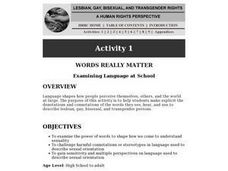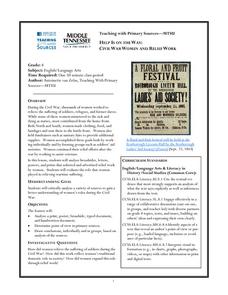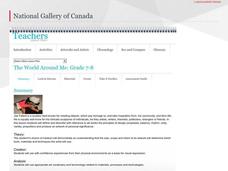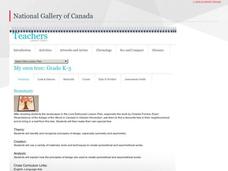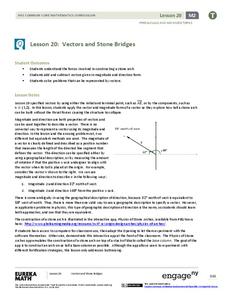National Endowment for the Humanities
Hopi Poetry
The Hopi refer to corn as their children, demonstrating its importance to the Native American group. Class members consider the role of literal and figurative language by examining poetry from this indigenous group. The resource includes...
Curated OER
Words Really Matter: Examining Language at School
Help your students gain sensitivity and become aware of the implications of the words they see, hear, and use about lesbian, gay, bisexual, and transgender people. After making lists of words or phrases they hear or use in school...
Practice Using Lively Language
Practice Using Lively Language
Combine a study of biography writing with some tips for spicing up writing. After reading two passages, one much more descriptive than the other, pupils examine what makes one more interesting. They then brainstorm some ideas for writing...
Curated OER
Smogasbord
When your environmental or earth science class is studying air pollution, you will want to take the time to go over this resource. Pupils peruse the history of air pollution regulations and examine outstanding diagrams of what...
University of California
Plankton
Plankton: so much more than just a SpongeBob character. Three different activities have kids looking at both phytoplankton and zooplankton in pictures, as well as collecting their own samples (depending on your access to a saltwater...
Middle Tennessee State University
Help Is on the Way: Civil War Women and Relief Work
The role women played in the Civil War, especially in relief efforts, is the focus of this seven-page resource. Groups examine primary source materials to determine how this work reflected and expanded the traditional roles women held in...
Curated OER
Carta del tratado entre España y los Estados Unidos
Explore the history between Spain and the United States. Class members examine a copy of an original letter written in 1821 by Colonel Jose Coppinger in St. Augustine, Florida about the treaty that refers to the Florida territory that...
Curated OER
Pedro Menéndez de Avilés
Partners examine the family tree of Pedro Menéndez de Avilés, a Spanish admiral and explorer who founded St. Augustine, Florida, and answer several questions about the text using a worksheet. After they've explored the family tree,...
National Geographic
Battery Lesson Plan
Not really just a lesson plan, but a series of activities, reading handouts, and teacher's guidelines for conducting a class mini unit on the battery. Physical scientists focus on the history of the cell battery, experiment with...
Student Handouts
Examining Primary Sources: Rudyard Kipling, “The White Man’s Burden” (1899)
Combine literature and history with the poem "The White Man's Burden" by Rudyard Kipling. Pupils read the poem and answer four questions about the text.
National Gallery of Canada
The Roots of My Family
Represent family history visually by requiring your young artists to create family trees that express balance and symmetry. Pupils examine works of art, research their family histories, and put together large family tree posters.
National Gallery of Canada
Contemporary Reflections
Combine art and writing in a lesson about legends. After viewing Inuit art, class members examine their own cultural surroundings in order to write and visually represent a legend. Individuals are invited to take the creative reins when...
Newseum
The Medium Shapes the Message
Where do you get your news? Have learners examine four different publications and decide which one they would choose to read on their own time. The resource includes a list of publication types to supply and a worksheet for groups...
Newseum
Today's Front Pages
Take a close look at a number of newspapers with collection of lessons and activities. Using a poster (which can be found under the materials tab), learners examine the hard copy of a local newspaper. This leads into an exploration of...
National Gallery of Canada
The World Around Me
Have your learners use their surroundings as inspiration for an art project. Class members first examine and discuss art. They then choose an area and spend five days taking down observations in written and sketch form. These...
National Gallery of Canada
My Own Tree
Nature contains both symmetry and asymmetry. Have your young artists examine symmetry and asymmetry in their own surroundings. After viewing works of art, pupils find trees in their neighborhoods and determine if they...
Rural Science Education Program
Bees and Flowers – Partners in Pollination
Why are bees so important? After several activities where kids investigate the form and function of flowers, they learn about the different types of bees and label them. They then examine pollen under a microscope and decide which bees...
Do2Learn
Processing Cause and Effect
Examine one cause and its effect in-depth. To complete this graphic organizer, learners write down a topic, the cause, the effect, and a brief analysis of the cause and effect relationship.
EngageNY
Algebraic Expressions—The Commutative and Associative Properties
Who says math is boring? Turn dry concepts like properties and vocabulary into an interesting lesson! Examine the commutative and associative properties of addition and multiplication using geometric reinforcement. Through collaboration,...
Mikva Challenge
Deconstructing Campaign Messages and Perceptions
Target audience, covert message, explicit and implicit appeals. As part of an investigation of rhetorical devices used in campaign ads, class members examine and deconstruct the appeals in logos from...
EngageNY
Vectors and Stone Bridges
What does it take to build a stable arch? Pupils apply vectors and physics as they examine arched bridges and their structural integrity. They use vectors to represent the forces acting on the stone sections and make conclusions based on...
Advocates for Human Rights
Undocumented Immigrants
Stay or go? As part of a study of immigration and human rights, class members listen to the stories of several immigrants and must decide if the story was their own if they would stay in the United States as an undocumented...
Cornell University
Insect IPM
Find out the characteristics that makes a bug an insect with a workbook designed to inform scholars about the crawly creatures that live around us. Scholars complete an ant-themed word search, answer questions using a solution key,...
EngageNY
Grade 9 ELA Module 4, Unit 1, Lesson 10
What can consumers do to pressure companies to produce "ethically manufactured goods"? Readers examine the evidence Amy Odell uses in the supplemental text "How Your Addiction to Fast Fashion Kills" to support her argument and her...

